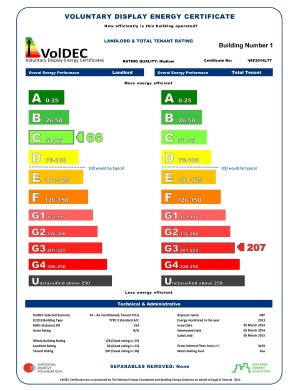The starting point for improving energy efficiency

Benchmarking energy performance of buildings is a vital first stage towards improving their energy efficiency. Malcolm Hanna of the National Energy Foundation describes a scheme that can help.
Those responsible for buildings increasingly find themselves having to manage energy better and improve its efficiency — whether because of the commercial bottom line, the ‘push’ of Government legislation and initiatives, the desire to combat climate change or the comfort and productivity of occupants.
It’s often a challenge to understand how much energy a building is using, and how it breaks down into uses, time periods, zones and tenants. It is, however, important as this knowledge is the basis for better energy management and identifying opportunities for energy-related improvements.
The first step is to gather key data about how a building is currently performing. Together with the building type (office, shopping centre, depot etc.), this can be used to compare performance either across a portfolio or against published benchmarks for different types of buildings.
Our not-for-profit VolDEC scheme can play an important role here. VolDEC has been developed in partnership with Phil Jones of Building Energy Solutions and is a new and innovative rating scheme for operational energy performance. It’s a robust engagement tool strengthened by data verification and auditing. VolDEC is based on relatively simple data — thereby making the ratings inexpensive, easy to understand and quick to produce. Importantly, the scheme flags up action to improve energy efficiency and drive down consumption.
|
Statutory DEC |
VolDEC | |
| Methodology |
Uses the methodology described in CIBSE TM47 |
Uses the methodology described in CIBSE TM47 |
| Benchmarks |
Uses CIBSE TM46 benchmarks This provides only one benchmark for all office types |
Uses ECON19 benchmarks for offices. This provides four different office types and energy is broken down by end use for each type |
| Rating scale | A-G rating scale |
Uses G1-G4 and U ratings, thereby providing more granular information for poor performing buildings |
| Data quality |
No specific data quality checks |
Uses a High/Medium/Low certificate data quality rating |
| Landlord/tenant split |
Unable to provide a separate landlord/ tenant DEC in the same building
|
Uses the granular energy breakdown in ECON19 to provide composite landlord and tenant benchmarks for seven different building scenarios |
VolDEC has been developed to meet the following needs of commercial office buildings.
• Have relevant benchmarks.
• Measure and highlight energy performance.
• Compare energy performance sensibly and consistently.
In addition, VolDECs overcome issues with the following.
• The inability to split out landlord and tenant energy performance.
• Compare the energy performance of buildings relative to either others managed by the same operator or in the same sector.
• The lack of flexibility in the available benchmarks.
In particular, VolDECs provide property owners and operators with energy ratings for the specific areas of a building that they control or manage, and are therefore able to improve.
VolDECs are based on the methodology used in mandatory Display Energy Certificates (DECs). They take all the good features of statutory DECs and make them better, easier and more informative (see table).
Following their piloting and testing in office buildings, VolDECs are now being further developed across the non-domestic property sector to cover other sectors such as shopping centres, restaurants, leisure facilities and hotels. They are also being further developed for buildings from a single large portfolio — such as a hotel chain.
Another aspect of the development of VolDECs is to improve efficiency in buildings by including other elements such as waste and water, and enabling clients to input their own data online.
As more buildings undergo VolDECs, benchmarks for different building types and servicing typologies will be refined, thereby providing a better understanding of how buildings compare with others and where the greatest potential for improvement lies.
Various external and internal pressures mean that building energy performance evaluation is fast-becoming unavoidably essential. Some see this as a burden, but the more enlightened view is that it provides opportunities. VolDEC can help meet these opportunities in a number of ways.
 |
| VolDECs can split out landlord and tenant energy performance. |
• Highlighting energy performance and providing a clear driver for improvement.
• Providing an entry-level engagement tool based on relatively simple data, making ratings easy to produce and inexpensive.
• Establishing a consistent methodology and quality level across the industry.
• Providing landlords and tenants with comparative energy performance of the areas that they control.
• Offering a starting point for tenant engagement.
• Using robust DEC methods but with more appropriate benchmarks and an extended rating scale.
• Helping to highlight anomalies and the need for more detailed investigations.
The VolDEC scheme provides a useful, cost-effective and relatively easy starting point for improving energy efficiency in buildings, and one you can build into a more sophisticated approach.
Malcolm Hanna is technical director with the National Energy Foundation. For further information on VolDECs visit the link below.







